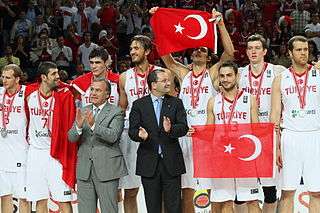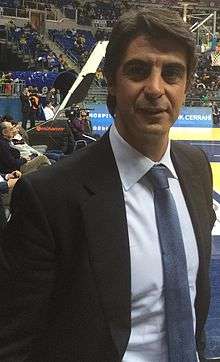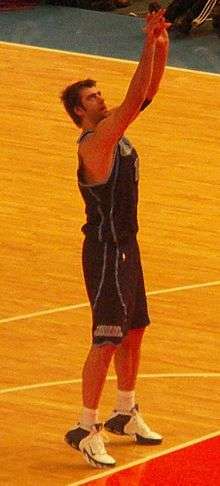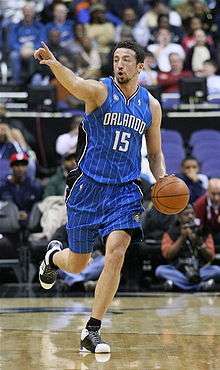Turkey national basketball team
| Turkey | |||
|---|---|---|---|
 | |||
| FIBA ranking |
8 | ||
| Joined FIBA | 1936 | ||
| FIBA zone | FIBA Europe | ||
| National federation | TBF | ||
| Coach | Ergin Ataman | ||
| Nickname(s) |
12 Dev Adam (12 Giant Men) | ||
| Olympic Games | |||
| Appearances | 2 | ||
| FIBA World Cup | |||
| Appearances | 4 | ||
| Medals |
| ||
| EuroBasket | |||
| Appearances | 24 | ||
| Medals |
| ||
| Uniforms | |||
| |||
The Turkey national basketball team represents Turkey in international basketball competitions organized by FIBA. The team is nicknamed "12 Dev Adam", meaning 12 Giant Men.
Turkey has won two silver medals at major international tournaments, namely the FIBA World Cup (2010) and FIBA EuroBasket (2001). Turkey has also won two gold (1987, 2013); one silver (1971); and three bronze (1967, 1983, 2009) medals at the Mediterranean Games.
Currently, Turkey stands 8th in the FIBA World Rankings.
History
Ahmet Robenson was known as being the first organizer of basketball in Turkey.[1] In 1936, Turkey played their first ever basketball match against Greece, winning 49–12. For many years basketball was the second most popular sport in Turkey, but the national team could not win any international tournaments until the 1980s, when Turkey won the gold medal at the 1981 Balkan Championship and the 1987 Mediterranean Games. Efes Pilsen was the first Turkish club to win a European Cup in any sport, the 1995–96 FIBA Korać Cup. Since then, basketball in Turkey has grown constantly, as the national basketball team began to play a major role in international tournaments. The Turkish national team won the silver medal in EuroBasket 2001, and the silver medal in the 2010 FIBA World Championship.[2]
1930s–1940s
Turkey's European championship debut came at EuroBasket 1949. The Turks split their six games in the seven-team round robin tournament, finishing with three wins and three losses for 4th place.[3]
1950s
Turkey competed again at EuroBasket 1951 in Paris. Their only loss in the preliminary round was to the Soviet Union as Turkey earned the second-rank spot with a 3–1 record. Their single loss to Bulgaria in the semi-final round, however, was enough to bump them from championship contention as they came out on the bottom of a three-way tie with a 2–1 record. They won their classification 5–8 game, but lost the 5/6 game to Italy.
Turkey returned after missing 1953's edition to EuroBasket 1955 in Budapest. They went 1–2 in their preliminary round group, taking third in the pool and moving to classification play. There they lost only to France on their way to a 3–1 record in classification round 1. They lost their 9–12 semi-final by 1 point to Finland, but defeated England 77–54 in the next game to take 11th place of the 18 team tournament.
Turkey appeared again at EuroBasket 1957 in Sofia. Losing to the Soviet Union and Poland in the preliminary round, Turkey took third in the group to be sent to the classification pool. They defeated each of the other seven teams in the classification round in order to take 9th place of the 16 teams.
1960s–1980s
The 1960s, 1970s and 1980s were in general a barren period for the Turkish national basketball team. They were, however, successful at the Mediterranean Games, winning two bronze medals in 1967 and 1983, one silver medal in 1971, and one gold medal in 1987. Turkey also won the gold medal at the Balkan Championship in 1981. The team was led by notable coaches like Yalçın Granit and Mehmet Baturalp in the 1960s and 1970s, and by Aydan Siyavuş during the Balkan and Mediterranean triumphs of the 1980s, which marked the dawn of a successful new era in Turkish basketball (especially in European club competitions) starting from the late 1980s and early 1990s. Efe Aydan and Erman Kunter were among the notable players of this period in Turkish basketball. Erman Kunter, who still holds a number of all-time records in the Turkish Basketball League as a player, later became a successful coach in the Turkish and French basketball leagues, and led the Turkish national team at the EuroBasket 1999.
1990s
Turkey appeared again at EuroBasket 1993 after 12 years of absence, but finished 11th among 16 teams. Turkey finished 13th among 14 teams at the EuroBasket 1995, 8th among 16 teams at the EuroBasket 1997, and again 8th among 16 teams at the EuroBasket 1999.
2000s

As the host country of the EuroBasket 2001, the Turkish national basketball team, led by coach Aydın Örs, reached the EuroBasket final for the first time in their history (a few years earlier, Aydın Örs had reached the final of the 1992–93 FIBA Saporta Cup and won the 1995–96 FIBA Korać Cup as the coach of Turkish club Efes Pilsen, which was the first European title won by a Turkish basketball team.) Turkey defeated Croatia in the quarter-finals and Germany in the semi-finals, before playing with Yugoslavia in the final. Turkey lost the game 69–78 and finished the tournament with the silver medal. Turkish star İbrahim Kutluay scored 19 points in the final game and was included in the all-tournament team.
Turkey then qualified for the 2002 FIBA World Championship. Turkey had 4 wins and 4 defeats at the championship and finished 9th.
At the EuroBasket 2003, Turkey reached the second round where they got eliminated by Serbia and Montenegro.
Turkey qualified for the EuroBasket 2005 held in Serbia and Montenegro, but lost to Lithuania (87–75) and Croatia (80–67), defeating only Bulgaria (94–89) in the preliminary round. This win brought Turkey to the knock-out stage, where Germany eliminated the team 66–57. Turkey ended the tournament with a 9–12 rank.
Turkey was awarded one of the four wild cards by FIBA for the qualification to the 2006 FIBA World Championship in Japan.
The Turkish squad completed the preliminary rounds in Group C at second place after the Greek team, and was entitled to play in the round of 16, winning 4 matches against Lithuania (76–74), Australia (76–68), Brazil (73–71) and Qatar (76–69) out of 5 games in total, losing only to Greece (69–76) in the last match. The young team also achieved the first official win over Lithuania and the first ever 4 consecutive wins in a championship. On August 26, 2006, the Turkish national team qualified for the Elite Eight, defeating Slovenia by 90–84. In the quarter-finals, Turkey lost to Argentina. They managed to defeat Lithuania once again before losing to France, finishing 6th.
A new nickname, "12 Cesur Yürek" (12 Brave Hearts) was proposed after the young and inexperienced team's surprising performance in the 2006 World Championship, despite not having star players Hidayet Türkoğlu, Mehmet Okur, Mirsad Türkcan, Kerem Tunçeri and Hüseyin Beşok.
At the EuroBasket 2007, Turkey played in Group C with Lithuania, Germany and the Czech Republic. Turkey began by losing 86–69 to Lithuania and was then blown out 79–49 by Germany. The team ended group play with an 80–72 win over fellow bottom-of-the-group team Czech Republic. With that win Turkey advanced to the next round, but the team lost all its games (66–51 to Slovenia, 84–75 to Italy, 85–64 to France) in that round. Turkey was eliminated from the EuroBasket 2007 with a 1–5 record and an 11th-place finish.
At the EuroBasket 2009, Turkey played in Group D with hosts Poland, Lithuania and Bulgaria. The Group D matches took place in Wrocław, Poland. Turkey won all three of its group matches and qualified for the second round. Turkey enjoyed a strong start in the second round as well. The team won its first match, against World Champions Spain, when Aşık and İlyasova rejected a last-second shot by Sergio Llull. Turkey then beat Serbia in overtime. Turkey's winning streak came to an end against Slovenia, when, despite a 19-point comeback, Atsür missed a desperation three pointer in a 69–67 loss. In the quarter-finals, Turkey met Greece and lost a close game in overtime, finishing the tournament 8th. Yet, in the same year, Turkey won the bronze medal at the 2009 Mediterranean Games.
2010s

As the host country, Turkey, led by coach Bogdan Tanjević, automatically qualified for the 2010 FIBA World Championship. Turkey topped their group, winning all their games against Côte d'Ivoire, Russia, Greece, Puerto Rico and China. In the knockout stages Turkey managed to defeat France, Slovenia and Serbia in a thrilling semi-final match which Turkey won 83–82. The team enjoyed its greatest FIBA success to date, going undefeated in group play and progressing to the final, where they eventually lost to the United States and won the silver medal. Each player was awarded a prize of 1,500,000 TL (approximately $1,000,000 in September 2010) from the Turkish government for being the runner-up in the competition.[4]
Orhun Ene was appointed head coach to lead Turkey during the EuroBasket 2011. The team had a bad tournament as they got eliminated in the second group phase after losing three straight games. Enes Kanter, the big potential of international basketball, was included in the roster for the first time. Turkey and Serbia were the only teams that managed to defeat EuroBasket 2011 winners Spain during the tournament. In that same year, Turkey won their second gold medal in the 2013 Mediterranean Games by defeating Serbia in the final.
At the EuroBasket 2013, Turkey managed to defeat only Sweden, and finished 17th.
On March 22, 2014, the Turkish Basketball Federation announced that Ergin Ataman will lead the team during the 2014 FIBA Basketball World Cup, EuroBasket 2015 and the 2016 Summer Olympics. Ergin Ataman is one of the most successful Turkish coaches in European club competitions, having won the 2001–02 FIBA Saporta Cup with the Italian club Montepaschi Siena, the 2011–12 FIBA EuroChallenge with the Turkish club Beşiktaş, and the 2015–16 EuroCup with the Turkish club Galatasaray.
The Turkish team failed to qualify for the 2016 Summer Olympics after a loss to France.
Honours
The Turkish national team's medal record through the years:
| Games | Gold | Silver | Bronze | Total |
|---|---|---|---|---|
| FIBA World Cup | 0 | 1 | 0 | 1 |
| EuroBasket | 0 | 1 | 0 | 1 |
| Mediterranean Games | 2 | 1 | 3 | 6 |
| Grand Totals | 2 | 3 | 3 | 8 |
Competitive record
FIBA World Cup
Olympic Games
Mediterranean Games
|
EuroBasket
| ||||||||||||||||||||||||||||||||||||||||||||||||||||||||||||||||||||||||||||||||||||||||||||||||||||||||||||||||||||||||||||||||||||||||||||||||||||||||||||||||||||||||||||||||||||||||||||||||||||||||||||||||||||||||||||||||||||||||||||||||||||||||||||||||||||||||||||||||||||||||||||||||||||||||||||||||||||||||||||||||||||||||||
Team
Current roster
Roster for the The men's qualification for the 2016 Summer Olympic basketball tournament.
| Turkey men's national basketball team roster | ||||||||||||||||||||||||||||||||||||||||||||||||||||||||||||||||||||||||||||||||||||||||||||
|---|---|---|---|---|---|---|---|---|---|---|---|---|---|---|---|---|---|---|---|---|---|---|---|---|---|---|---|---|---|---|---|---|---|---|---|---|---|---|---|---|---|---|---|---|---|---|---|---|---|---|---|---|---|---|---|---|---|---|---|---|---|---|---|---|---|---|---|---|---|---|---|---|---|---|---|---|---|---|---|---|---|---|---|---|---|---|---|---|---|---|---|---|
| Players | Coaches | |||||||||||||||||||||||||||||||||||||||||||||||||||||||||||||||||||||||||||||||||||||||||||
|
| |||||||||||||||||||||||||||||||||||||||||||||||||||||||||||||||||||||||||||||||||||||||||||
Depth Chart
Notable players
Other current notable players from Turkey:
| Turkey roster | ||||||||||||||||||||||||||||
|---|---|---|---|---|---|---|---|---|---|---|---|---|---|---|---|---|---|---|---|---|---|---|---|---|---|---|---|---|
| Players | Coaches | |||||||||||||||||||||||||||
| ||||||||||||||||||||||||||||
Past rosters
- Scroll down to see more.
1936 Olympic Games: finished 21st among 21 teams
Kamil Ocak, Şeref Alemdar, Naili Moran, Hazdayi Penso, Nihat Ertuğ, Jak Habib, Feridun Koray, Dionis Sakalak, Sadri Usluoğlu, Hayri Arsebük (Coach: Rupen Semerciyan)
1949 EuroBasket: finished 4th among 7 teams
Hüseyin Öztürk, Samim Göreç, Ali Uras, Avram Barokas, Mehmet Ali Yalım, Tevfik Tankut, Sacit Seldüz, Erdoğan Partener, Ayduk Koray, Haşim Tankut, Candaş Tekeli, Vitali Benazus
1951 EuroBasket: finished 6th among 17 teams
Yalçın Granit, Ali Uras, Mehmet Ali Yalım, Avram Barokas, Sacit Seldüz, Nejat Diyarbakırlı, Yılmaz Gündüz, Cemil Sevin, Sadi Gülçelik, Ertem Göreç, Ayhan Demir
1952 Olympic Games: finished 22nd among 23 teams
Yalçın Granit, Ali Uras, Mehmet Ali Yalım, Altan Dinçer, Sacit Seldüz, Nejat Diyarbakırlı, Yılmaz Gündüz, Sadi Gülçelik, Yüksel Alkan, Turhan Tezol, Erdoğan Partener, Güney Ülmen
1955 EuroBasket: finished 11th among 18 teams
Yalçın Granit, Mehmet Ali Yalım, Altan Dinçer, Sadi Gülçelik, Tunç Erim, Yüksel Alkan, Turhan Tezol, Yalçın Okaya, Yavuz Türkoğlu, Üner Erimer, Yüksel Böke, Erdoğan Karabelen, Cahit Tanık, Şinasi Ertan
1957 EuroBasket: finished 9th among 16 teams
Yalçın Granit, Mehmet Baturalp, Orhan Girgin, Tunç Erim, Yavuz Türkoğlu, Yılmaz Gündüz, Altan Dinçer, Turhan Tezol, Üner Erimer, Erdoğan Karabelen, Erkan Gündüz
1959 EuroBasket: finished 12th among 17 teams
Mehmet Baturalp, Ünal Büyükaycan, Nedret Uyguç, Şengün Kaplanoğlu, Turhan Tezol, Tunç Erim, Ömer Urkon, Özer Salnur, Erdoğan Karabelen, Güner Yalçıner, Tuğrul Demir, Ali Kazaz (Coach: Samim Göreç)
1961 EuroBasket: finished 10th among 19 teams
Mehmet Baturalp, Şengün Kaplanoğlu, Nedret Uyguç, Dursun Açıkbaş, Altan Dinçer, Tuncer Kobaner, Haşim Ülkü, Ömer Urkon, Ali Kazaz, Yavuz Demir, Erdal Poyrazoğlu, Ersan Salihoğlu (Coach: Yalçın Granit)
1963 EuroBasket: finished 15th among 16 teams
Mehmet Baturalp, Nedret Uyguç, Nedim Hoşgör, Ünal Büyükaycan, Şengün Kaplanoğlu, Tuncer Kobaner, Haşim Ülkü, Özer Salnur, Halil Dağlı, İlker Esel, Hüseyin Kozluca, Yavuz Demir (Coach: Yalçın Granit)
1971 EuroBasket: finished 12th among 12 teams
Nur Germen, Hüseyin Alp, Kemal Erdenay, Nadir Vekiloğlu, Barış Küce, Battal Durusel, Zeki Tosun, Reşat Güney, Cihat İlkbaşaran, Serdar Ersözlü, Abdullah İnce (Coach: Mehmet Baturalp)
1973 EuroBasket: finished 8th among 12 teams
Aydın Örs, Doğan Hakyemez, Kemal Erdenay, Battal Durusel, Reşat Güney, Nuri Tan, Serdar Ersözlü, Necmi Ton, Zeki Tosun, Erdal Poyrazoğlu, Abdullah İnce, Halil Dağlı (Coach: Mehmet Baturalp)
1975 EuroBasket: finished 9th among 12 teams
Nur Germen, Kemal Erdenay, Doğan Hakyemez, Efe Aydan, Barış Küce, Battal Durusel, Nadir Vekiloğlu, Ömürden Kısagün, Zeki Tosun, Erdal Poyrazoğlu, Abdullah İnce, Kemal Akıncı (Coach: Mehmet Baturalp)
1981 EuroBasket: finished 11th among 12 teams
Efe Aydan, Erman Kunter, Doğan Hakyemez, Aytek Gürkan, Emir Turam, Necati Güler, Mehmet Döğüşken, Serdar Koçyiğit, Melih Erçin, Cevat Soydaş, Celal Arısan, Sadi Olcay (Coach: Aydan Siyavuş)
1993 EuroBasket: finished 11th among 16 teams
Harun Erdenay, Orhun Ene, Lütfi Arıboğan, Levent Topsakal, Ömer Büyükaycan, Hüsnü Çakırgil, Tamer Oyguç, Volkan Aydın, Serdar Apaydın, Murat Konuk, Erdal Koşan, Ömer Saybir (Coach: Nur Germen)
1995 EuroBasket: finished 13th among 14 teams
Harun Erdenay, Orhun Ene, İbrahim Kutluay, Haluk Yıldırım, Levent Topsakal, Ömer Büyükaycan, Tamer Oyguç, Lütfi Arıboğan, Mirsad Türkcan, Murat Konuk, Murat Evliyaoğlu, Serdar Apaydın (Coach: Çetin Yılmaz)
1997 EuroBasket: finished 8th among 16 teams
İbrahim Kutluay, Harun Erdenay, Orhun Ene, Ufuk Sarıca, Mirsad Türkcan, Tamer Oyguç, Hüseyin Beşok, Volkan Aydın, Murat Evliyaoğlu, Murat Konuk, Tunç Girgin, Kemal Tunçeri (Coach: Ercüment Sunter)
1999 EuroBasket: finished 8th among 16 teams
Hidayet Türkoğlu, İbrahim Kutluay, Mehmet Okur, Mirsad Türkcan, Ufuk Sarıca, Hüseyin Beşok, Tamer Oyguç, Haluk Yıldırım, Murat Konuk, Kerem Tunçeri, Cüneyt Erden, Asım Pars (Coach: Erman Kunter)
2001 EuroBasket: finished 2nd among 16 teams
İbrahim Kutluay, Hidayet Türkoğlu, Mehmet Okur, Mirsad Türkcan, Hüseyin Beşok, Harun Erdenay, Orhun Ene, Haluk Yıldırım, Kaya Peker, Kerem Tunçeri, Ömer Onan, Asım Pars (Coach: Aydın Örs)
2002 World Championship: finished 9th among 16 teams
Hidayet Türkoğlu, Mehmet Okur, İbrahim Kutluay, Harun Erdenay, Mirsad Türkcan, Hüseyin Beşok, Haluk Yıldırım, Kerem Tunçeri, Kaya Peker, Ömer Onan, Hakan Köseoğlu, Asım Pars (Coach: Aydın Örs)
2003 EuroBasket: finished 12th among 16 teams
Hidayet Türkoğlu, Mehmet Okur, İbrahim Kutluay, Mirsad Türkcan, Hüseyin Beşok, Kaya Peker, Kerem Gönlüm, Kerem Tunçeri, Ender Arslan, Ömer Onan, Haluk Yıldırım, Rasim Başak (Coach: Aydın Örs)
2005 EuroBasket: finished 9th among 16 teams
Hidayet Türkoğlu, Mehmet Okur, İbrahim Kutluay, Serkan Erdoğan, Mirsad Türkcan, Kaya Peker, Ermal Kurtoğlu, Kerem Gönlüm, Kerem Tunçeri, Ender Arslan, Cenk Akyol, Fatih Solak (Coach: Bogdan Tanjević)
2006 World Championship: finished 6th among 24 teams
İbrahim Kutluay, Serkan Erdoğan, Ersan İlyasova, Kaya Peker, Kerem Gönlüm, Ermal Kurtoğlu, Ender Arslan, Semih Erden, Engin Atsür, Cenk Akyol, Hakan Demirel, Fatih Solak (Coach: Bogdan Tanjević)
2007 EuroBasket: finished 11th among 16 teams
Hidayet Türkoğlu, Mehmet Okur, İbrahim Kutluay, Kaya Peker, Kerem Gönlüm, Ender Arslan, Ermal Kurtoğlu, Engin Atsür, Cenk Akyol, Ersan İlyasova, Semih Erden, Hakan Demirel (Coach: Bogdan Tanjević)
2009 EuroBasket: finished 8th among 16 teams
Bekir Yarangüme, Sinan Güler, Engin Atsür, Ömer Onan, Ersan İlyasova, Semih Erden, Kerem Tunçeri, Oğuz Savaş, Ömer Aşık, Ender Arslan, Barış Hersek, Hidayet Türkoğlu (Coach: Bogdan Tanjević)
2010 World Championship: finished 2nd among 24 teams
Cenk Akyol, Sinan Güler, Barış Ermiş, Ömer Onan, Ersan İlyasova, Semih Erden, Kerem Tunçeri, Oğuz Savaş, Kerem Gönlüm, Ender Arslan, Ömer Aşık, Hidayet Türkoğlu (Coach: Bogdan Tanjević)
2011 EuroBasket: finished 11th among 24 teams
Cenk Akyol, Sinan Güler, Enes Kanter, Ömer Onan, Ersan İlyasova, İzzet Türkyılmaz, Kerem Tunçeri, Oğuz Savaş, Ömer Aşık, Ender Arslan, Emir Preldžič, Hidayet Türkoğlu (Coach: Orhun Ene)
2013 EuroBasket: finished 17th among 24 teams
Doğuş Balbay, Sinan Güler, Birkan Batuk, Serhat Çetin, Ersan İlyasova, Semih Erden, Kerem Gönlüm, Oğuz Savaş, Ömer Aşık, Ender Arslan, Emir Preldžič, Hidayet Türkoğlu (Coach: Bogdan Tanjević)
2014 World Cup: finished 8th among 24 teams
Cedi Osman, Sinan Güler, Barış Ermiş, Cenk Akyol, Barış Hersek, Emir Preldžič, Kerem Tunçeri, Oğuz Savaş, Kerem Gönlüm, Ender Arslan, Ömer Aşık, Furkan Aldemir (Coach: Ergin Ataman)
Head coach position
 Ercüment Sunter – 1995–97
Ercüment Sunter – 1995–97 Erman Kunter – 1998–99
Erman Kunter – 1998–99 Aydın Örs – 1996, 2000–03
Aydın Örs – 1996, 2000–03 Orhun Ene – 2011
Orhun Ene – 2011
 Bogdan Tanjević – 2004–07, 2009–10, 2012–13
Bogdan Tanjević – 2004–07, 2009–10, 2012–13 Ergin Ataman – 2014–2016
Ergin Ataman – 2014–2016
Memorable victories
EuroBasket 1951: ![]() Turkey –
Turkey – ![]() Greece 42–36
Greece 42–36
EuroBasket 1955: ![]() Turkey –
Turkey – ![]() Denmark 82–33
Denmark 82–33
EuroBasket 1955: ![]() Turkey –
Turkey – ![]() England 77–54
England 77–54
EuroBasket 1957: ![]() Turkey –
Turkey – ![]() Italy 57–50
Italy 57–50
EuroBasket 1957: ![]() Turkey –
Turkey – ![]() Spain 53–50
Spain 53–50
EuroBasket 1961: ![]() Turkey –
Turkey – ![]() Czechoslovakia 77–70
Czechoslovakia 77–70
EuroBasket 1973: ![]() Turkey –
Turkey – ![]() Poland 65–64
Poland 65–64
EuroBasket 1975: ![]() Turkey –
Turkey – ![]() Greece 74–64
Greece 74–64
1980 Islamic Games: ![]() Turkey –
Turkey – ![]() Libya 142–45
Libya 142–45
EuroBasket 1997: ![]() Turkey –
Turkey – ![]() Israel 81–71
Israel 81–71
EuroBasket 1997: ![]() Turkey –
Turkey – ![]() France 82–71
France 82–71
EuroBasket 1999: ![]() Turkey –
Turkey – ![]() Croatia 70–63
Croatia 70–63
EuroBasket 1999: ![]() Turkey –
Turkey – ![]() Germany 63–55
Germany 63–55
EuroBasket 2001: ![]() Turkey –
Turkey – ![]() Latvia 85–82
Latvia 85–82
EuroBasket 2001: ![]() Turkey –
Turkey – ![]() Spain 84–79
Spain 84–79
EuroBasket 2001: ![]() Turkey –
Turkey – ![]() Croatia 87–85
Croatia 87–85
EuroBasket 2001: ![]() Turkey –
Turkey – ![]() Germany 79–78
Germany 79–78
EuroBasket 2005: ![]() Turkey –
Turkey – ![]() Bulgaria 94–89
Bulgaria 94–89
2002 FIBA World Championship: ![]() Turkey –
Turkey – ![]() Russia 91–86
Russia 91–86
2006 FIBA World Championship: ![]() Turkey –
Turkey – ![]() Lithuania 76–74
Lithuania 76–74
2006 FIBA World Championship: ![]() Turkey –
Turkey – ![]() Brazil 73–71
Brazil 73–71
2006 FIBA World Championship: ![]() Turkey –
Turkey – ![]() Slovenia 90–84
Slovenia 90–84
2006 FIBA World Championship: ![]() Turkey –
Turkey – ![]() Lithuania 95–84
Lithuania 95–84
EuroBasket 2009: ![]() Turkey –
Turkey – ![]() Lithuania 84–76
Lithuania 84–76
EuroBasket 2009: ![]() Turkey –
Turkey – ![]() Poland 87–69
Poland 87–69
EuroBasket 2009: ![]() Turkey –
Turkey – ![]() Spain 63–60
Spain 63–60
EuroBasket 2009: ![]() Turkey –
Turkey – ![]() Serbia 69–64
Serbia 69–64
2009 Mediterranean Games: ![]() Turkey –
Turkey – ![]() Italy 121–119
Italy 121–119
2010 FIBA World Championship: ![]() Turkey –
Turkey – ![]() Russia 65–56
Russia 65–56
2010 FIBA World Championship: ![]() Turkey –
Turkey – ![]() Greece 76–65
Greece 76–65
2010 FIBA World Championship: ![]() Turkey –
Turkey – ![]() Puerto Rico 79–77
Puerto Rico 79–77
2010 FIBA World Championship: ![]() Turkey –
Turkey – ![]() France 95–77
France 95–77
2010 FIBA World Championship: ![]() Turkey –
Turkey – ![]() Slovenia 95–68
Slovenia 95–68
2010 FIBA World Championship: ![]() Turkey –
Turkey – ![]() Serbia 83–82
Serbia 83–82
EuroBasket 2011: ![]() Turkey –
Turkey – ![]() Spain 65–57
Spain 65–57
2013 Mediterranean Games: ![]() Turkey –
Turkey – ![]() Serbia 79–62
Serbia 79–62
2014 World Cup: ![]() Turkey –
Turkey – ![]() New Zealand 76–73
New Zealand 76–73
2014 World Cup: ![]() Turkey –
Turkey – ![]() Finland 77–73
Finland 77–73
2014 World Cup: ![]() Turkey –
Turkey – ![]() Australia 65–64
Australia 65–64
EuroBasket 2015: ![]() Turkey –
Turkey – ![]() Italy 89–87
Italy 89–87
EuroBasket 2015: ![]() Turkey –
Turkey – ![]() Germany 80–75
Germany 80–75
Gallery
 Ibrahim Kutluay is the only Turkish player that has won the Euroleague title.
Ibrahim Kutluay is the only Turkish player that has won the Euroleague title. Mehmet Okur became the first Turkish player to win an NBA championship.
Mehmet Okur became the first Turkish player to win an NBA championship. Hidayet Türkoğlu is among the most successful foreign NBA players.
Hidayet Türkoğlu is among the most successful foreign NBA players.- Kerem Tunçeri was a key member of the national team that won the silver medal at the 2010 FIBA World Championship.
 Bogdan Tanjević managed the national team at the 2010 FIBA World Championship.
Bogdan Tanjević managed the national team at the 2010 FIBA World Championship.- Ergin Ataman is the current manager of the national team.
Kit
Manufacturer
Sponsor
Notes
- ↑ Along with Germany, hosts were France, Croatia and Latvia. Turkey were drawn in Group B, and therefore they competed in Germany. The further tournament stages were held in France.
See also
- Turkey women's national basketball team
- Turkey national under-19 basketball team
- Turkey national under-17 basketball team
- Turkey national 3x3 team
References
| Wikimedia Commons has media related to Turkey national basketball team. |
- ↑ The Club Scene: Galatasaray C.C., eurocupbasketball.com, Nov 17, 2009. Retrieved 17 October 2014.
- ↑ 2010 FIBA World Championship | ARCHIVE.FIBA.COM, FIBA.com, Retrieved 20 October 2015.
- ↑ 1949 European Championship for Men | ARCHIVE.FIBA.COM, FIBA.com, Retrieved 20 October 2015.
- ↑ http://www.milliyet.com.tr/2010/09/12/spor/
- 1 2 Turkey | EuroBasket 2015 - PHOTO GALLERY, eurobasket2015.org, Retrieved 30 Dec 2015.